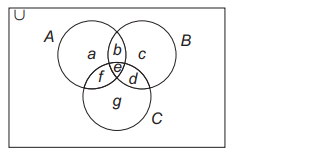Q. In a survey, it was found that 21 people like product $A$, 26 like product $B$ and 29 like product $C$. If 14 people like products $A$ and $B, 12$ people like products $C$ and $A, 14$ people like products $B$ and $C$ and 8 like all the three products, then number of people who liked product $C$ only, is
Sets
Solution:
